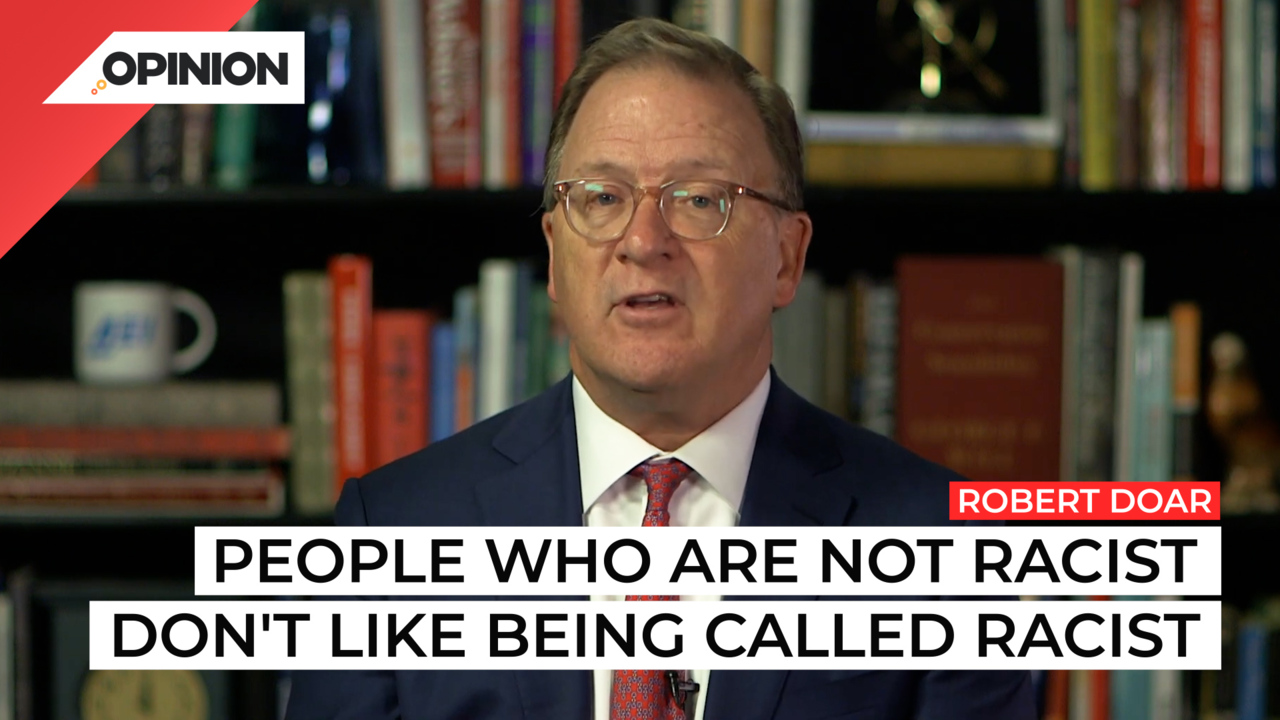
Commentary
-
Our commentary partners will help you reach your own conclusions on complex topics.
As the president of a Washington based think tank, I get invited to a lot of gatherings of academics and journalists and leaders from the corporate and political world. At these gatherings held in lovely American settings that showcase some of our nation’s best attributes. We talk a lot about what’s wrong with America. At one such gathering recently, I heard a writer for a prominent East Coast magazine say that we Americans are reluctant to face up to our nation’s racist past, that we bury the truth about slavery or Jim Crow, or persistent poverty among black Americans. And I thought to myself, That’s not true. It’s more of the opposite in Hollywood and the press, from our political leaders in our schools. Everywhere we turn, we are told the heartbreaking stories of slavery of the violent Ku Klux Klan and economic exploitation over and over again, it’s almost as if our speech and script writers, our news and movie producers know no other story, but the one about America’s past misdeeds. It’s no wonder then that our young people, especially the most highly educated, who spend the longest time absorbing this narrative, are so convinced that those problems persist, and that the heart of America and the people who live there are irredeemably racist. Well, if you live in most places in America, you get pretty tired of being told over and over again, that you are a racist, especially when you’re not, especially when you live and work alongside people of other races. Send your children to diverse schools are accustomed to celebrating your neighbors cultural heritage, and you even helped elect a black man to the presidency of the United States. It turns out, people who are not racist, don’t like being called racist. But race is not the only issue where Americans hear something condescending in the way coastal elites describe America. Now I know many brilliant writers from Naomi Schaefer Riley, to Rui to Shara and Barry Weiss, have written about liberal elites, condescension. So I’m not original to this topic, but I still want to talk about some of the areas where I’ve noticed it lately. Let’s take gender issues. ordinary Americans don’t get it when elites introduce themselves with him, or she her because it’s usually pretty easy to tell the difference. Moreover, most Americans don’t think it’s fair for biological males to compete in women’s sports. It’s become apparent that Americans don’t like being told repeatedly that their fundamental assumptions about the world are wrong. But elites still go on teaching the correct way to be respectful, assuming Americans are incapable of tolerating and being decent to different people. Without the elites special diversity training. Consider the mockery that religious people especially Christians have to endure. You don’t have to watch a lot of TV to know that Christians are most often portrayed as backward hillbillies, repressed hypocrites, or malicious moralists. increasingly popular shows like The Handmaid’s Tale, paint religious Christians as theocrats bent on moral domination. When in our society, it’s more often religious Christians who have to defend their freedom and values in court against the enforcement of liberal dogma. liberal elites have long seen the triumph of their enlightened values as something already enshrined, which the rest of society needs to get in line with their belief in their own superiority, inspires their condescension, partly because they so easily dismiss people of faith. Elites simply don’t understand Americans views on abortion, nor can they understand the role that Roe v Wade, which read a previously unthinkable right into the Constitution had and making the issue so polarizing. When Roe was decided, many Americans felt deeply betrayed by the invention of a national right to abortion that they found morally offensive. Having the nation’s highest court create an unlimited right to abortion also meant that elites didn’t have to justify their position in the public square of our democracy. It’s no wonder why people who see fetuses as the most vulnerable humans, and worthy of protection are angry at those who support the right to abortion, even in the third trimester. For Democrats, their uncompromising defense of on demand abortion has caused them to overlook the attitudes of much of their own base. Many pollsters and writers have seen that black and Hispanic Americans are shifting to the more pro life party the Republic lookin party because it shares their belief that human dignity extends to the unborn.
But it’s not just on social and cultural issues where our elites have lost the trust and confidence of regular Americans. Just look at how they’ve treated the subject of inflation. working class Americans immediately recognized inflation, for the threat it is. But for too long, policymakers and journalists kept saying that inflation was either non existent or a transitory issue. Or they said that inflation didn’t really matter, because the price changes only added a few $100 a month to everyday Americans cost of living, not realizing that for working class Americans, a few $100 A month is a lot of money. More than anything else, Donald Trump understood the hostility that elites condescending ways fostered among middle and working class Americans. He took up issues like free trade and illegal immigration where the consensus of elites was totally detached from the views of the people and push back against mainstream leaders who always seem to be apologizing on America’s behalf. That’s what made his surprising victory in 2016. Possible, had he not indulged in his own delusions after the 2020 election, he might still be leading the movement against the politics and policies of elite condescension. But other leading Republicans seem to have figured it out too. And that is why they are making big gains among working class Americans. Their emerging coalition without Trump is building into a wave that could lead to historic electoral results in the fall. Now, Republicans could blow it by putting the discredited wishes of a former president before the needs of ordinary Americans. But if they can move past Trump and win significant majorities, Republicans will have to address the many problems that regular Americans are facing right now. And they will have to do that with respect, not condescension.
-
Affirmative action ruling consistent with struggle against US racist past
When the Supreme Court struck down affirmative action programs at the University of North Carolina and Harvard, conservatives celebrated the decision, hailing it as a victory for a “colorblind” interpretation of the Constitution. Former President Donald Trump praised the ruling as a “great day for America.” Democrats, on the other hand, criticized the decision, arguing…
-
End of pandemic SNAP benefits a chance to improve food program
Millions of struggling American families in 32 states are now receiving less federal aid to buy food as the emergency funding for the SNAP food stamps program has expired. The emergency allotment, spurred by the COVID-19 outbreak, boosted the money that recipients received by at least $95 per month from SNAP, which stands for “supplemental…
-
Census data paints an inaccurate picture of inequality in America
The U.S. Census Bureau is a nonpartisan government agency, responsible for not only determining how many representatives each state will have in Congress for the next 10 years, but also for collecting income data. By asking about income, the Bureau’s intent is to “help communities enroll eligible families in programs designed to assist them.” But…
-
American men need to start taking more personal responsibility
Some members of the Republican party, such as former President Donald Trump and Sen. Josh Hawley (R-MO), blame Democrats for starting a war against American men. These voices want government action taken to protect men from policies meant to undermine their roles in society. But is government intervention really the answer? Straight Arrow News contributor Robert…
Latest Opinions
-
 U.S. Department of Defense
U.S. Department of Defense
Congress still trying to figure out how to reduce wasteful military spending
-
 DVIDS
DVIDS
US Navy, Air Force making waves with new weapons at RIMPAC
-
 Getty Images
Getty Images
Israeli PM Netanyahu meets with Trump at Mar-a-Lago
-
 Getty Images
Getty Images
Growing US nuclear power resurgence reaches the nation’s heartland
-
 Getty Images
Getty Images
Beer from the sun, other solar thermal projects get government funding
Popular Opinions
-
In addition to the facts, we believe it’s vital to hear perspectives from all sides of the political spectrum.


